Expedition aims to drive to both poles, having 'learned a lot' from past mishaps
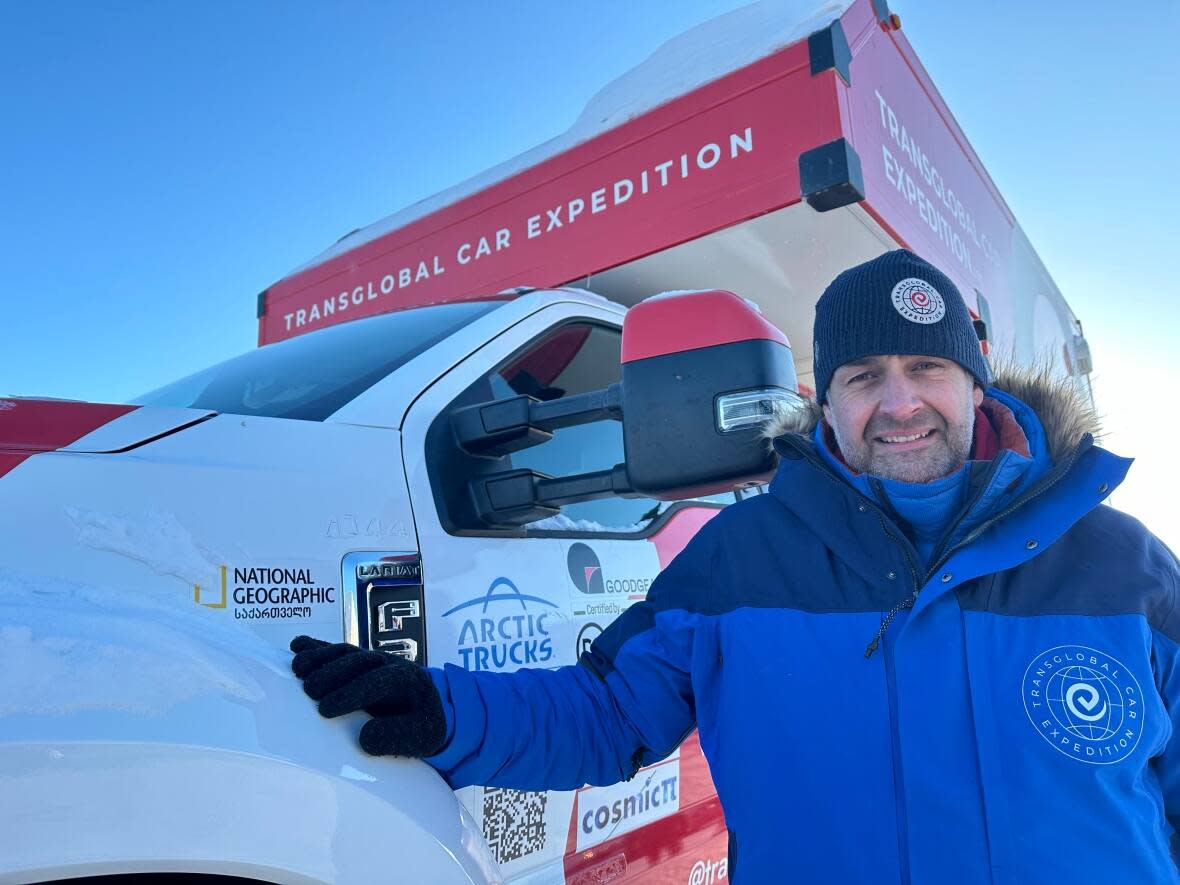
The Transglobal Car Expedition is back in the N.W.T. — with intentions to circle the entire globe by vehicle now — roughly two years after making headlines for violating airspace rules and sinking a truck.
Andrew Comrie-Picard, a member of the international team who comes from Edmonton, said they "learned a lot" from that pre-expedition trip in 2022.
"The ice can change really fast. And we also learned that the relationships of the Indigenous communities here are so crucially important," he said. "We learned that we have to rely on and share local knowledge in order to get through."
The expedition, which includes members from Canada, the U.S., Russia, Ukraine, Germany and Iceland, claims it will be the first to travel around the planet, reaching both poles, with wheeled vehicles. A crew of eight left New York City for the N.W.T. on Jan. 10, and now plans to head from Yellowknife to Resolute Bay, Nunavut, then to the North Pole. From there, the expedition will continue through Greenland, Europe, Africa, Antarctica and back up through South and Central America to the U.S.
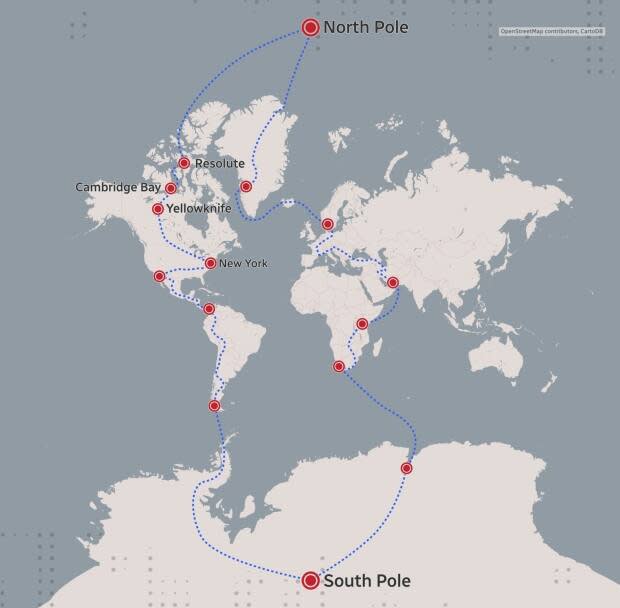
The trip is expected to take 17 months, and it's being done with a fleet of 12 vehicles.
From Yellowknife to Cambridge Bay, Nunavut, the team will drive three Ford Super Duty trucks modified to have six 44-inch tires. From there, they'll switch to four amphibious Yemelya vehicles that can travel over sections of open water to get to the North Pole and Greenland.
Those vehicles are already staged in Cambridge Bay.
What's the point?
Comrie-Picard said the expedition is gathering data for research projects along the way, including information about ice thickness, cosmic rays, light pollution and about their own bodies going through extremes.
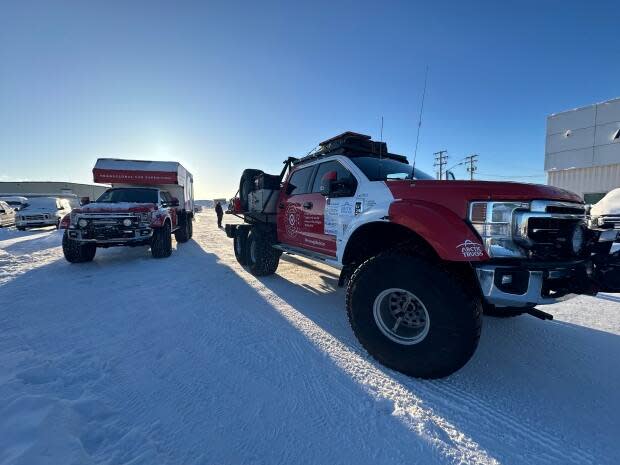
Pat Maher, a professor at Nipissing University in Ontario who studies Arctic tourism, told CBC News the expedition appears to be aligning itself with science in an effort to make itself relevant — and he's critical of the trip's overall purpose.
"I don't inherently see a value in it," he said.
"I think there's a motivation or a drive here, largely predicated on being the first," he said. "In today's day and age, in a time of climate emergency … it makes me question what is the necessity?"
Maher said expeditions in the Arctic, like Transglobal Car's, can have a positive, long-term impact on local communities by investing in scholarships or sponsorships.
In the absence of that, he said, communities can at least benefit from short-term local employment and money that's spent on things like fuel and groceries.
Maher said it's important to be critical of tourism. Believing that all Arctic expeditions are "inherently good" could mean that the potential impacts on local communities are overlooked, he said.
Cambridge Bay man joins trip again
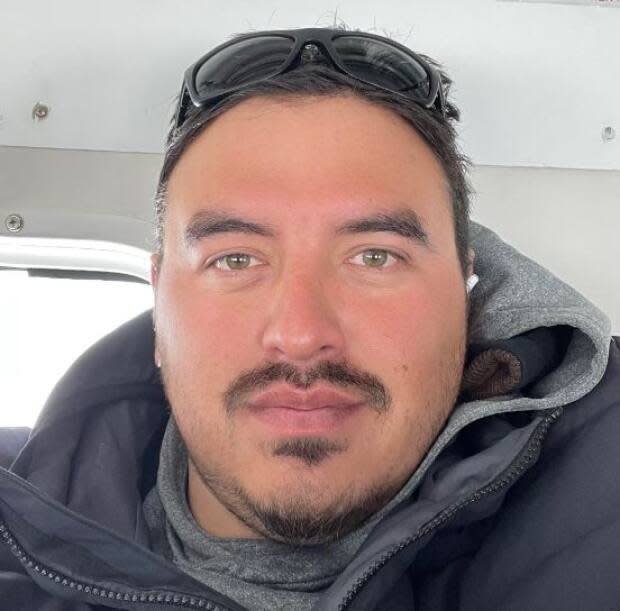
Comrie-Picard said the expedition is employing a local man from Cambridge Bay for the journey from that community to Resolute Bay. Brandon Langan, who has worked with the expedition before, said his main role will be to watch for polar bears and help navigate sea ice. Based on satellite imagery, he said, the ice is looking pretty rough.
"It's going to be exciting for sure," he said.
Langan said the expedition members are "expert" at navigating the ice, and they'll be pulling an ice-thickness radar along with them, information from which will be uploading to the cloud and accessible to hunters for the upcoming polar bear hunting season, he said.
He isn't worried the trip will be as eventful as the test run two years ago.
When the Transglobal Car Expedition flew to Yellowknife to test out part of the northern leg of its trip in early 2022, Transport Canada laid fines against a Russian passenger who chartered the aircraft and both pilots, as well as the flight's Switzerland-based operator.
Then, after successfully reaching Resolute Bay, one of the modified Ford F150s sank among the Tasmania Islands northwest of Taloyoak, Nunavut, on the return journey. Langan was in the truck when it broke the ice, and was part of the effort to help recover it later that year.
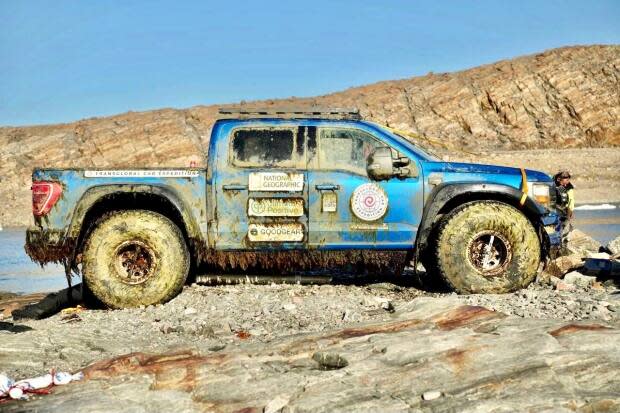
Still, he only had to think about the team's proposition to work together again for 30 seconds.
"I never say no to adventure," he laughed.
Community relationship
Langan said there is enthusiasm in his community about the expedition, particularly among the children.
"They love seeing these big vehicles," he said. "There's a sense of excitement."
Comrie-Picard also said the relationship with local communities has improved since recovering the lost truck about a year and a half ago. He said he ran into Jimmy Oleekatalik, the manager of the Spence Bay Hunters and Trappers Committee in Taloyoak, while in Yellowknife.
Oleekatalik had been critical after the expedition lost the truck in a prime hunting ground, and was relieved when the sunken truck was recovered. Comrie-Picard said their recent interaction had been friendly and jovial.
CBC News made attempts to reach Oleekatalik but was unsuccessful.


